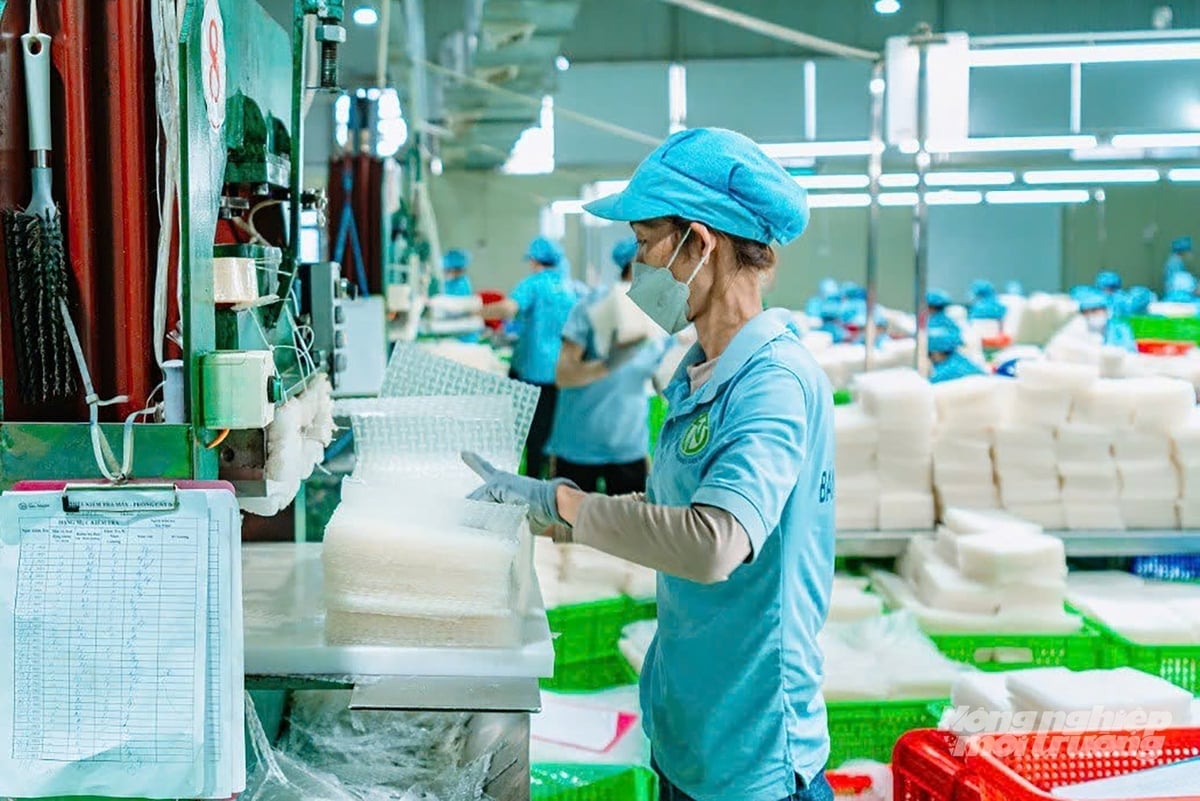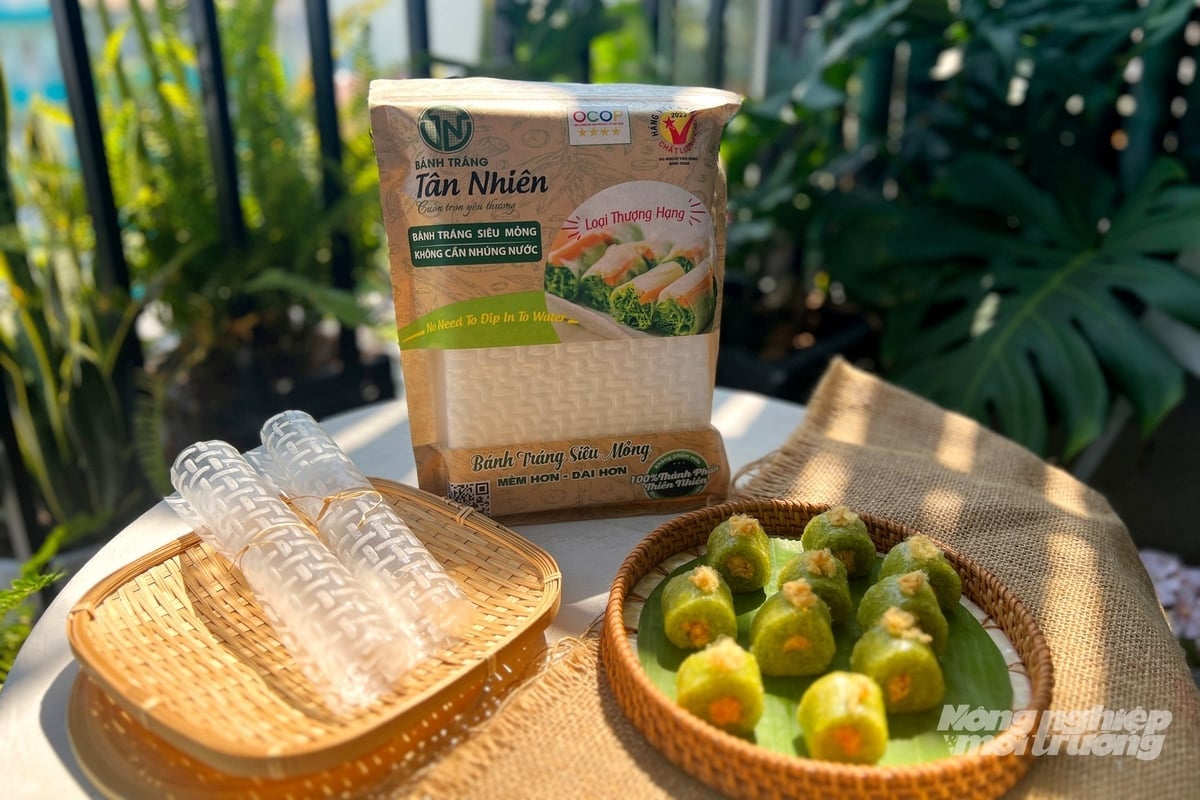October 3, 2025 | 14:22 GMT +7
October 3, 2025 | 14:22 GMT +7
Hotline: 0913.378.918
October 3, 2025 | 14:22 GMT +7
Hotline: 0913.378.918
With the goal of bringing local specialties to the global market, in 2018, Mr. Dang Khanh Duy built a factory and founded Tan Nhien Co., Ltd. in Tay Ninh province, laying the foundation for his big dream.
At that time, the first industrial rice papers were produced on a closed-loop production line - from mixing the flour and spreading the batter to drying with infrared ovens. Although not yet visually distinct from traditional rice paper, Tan Nhien's products quickly made their mark thanks to their cleanliness, safety, and production in a tightly controlled environment.

The main raw material used in Tan Nhien's rice paper production is cassava starch, sourced directly from the family-owned factory. This not only allows for strict control over input quality but also ensures a stable market for local farmers, contributing to the development of the local economy. Photo: Nguyen Thuy.
But the young CEO didn’t stop at his initial success. After witnessing the inconvenience of having to dip rice paper in water before eating, he asked himself: “Is it possible to create rice paper that’s soft, pliable, and delicious without soaking it?” And so, the journey of innovation began.
Tan Nhien continuously replaced its old machinery with modern equipment imported from Europe, modifying it to suit the unique characteristics of Vietnamese rice paper. After hundreds of trials and thousands of test sheets discarded, a new product was born: ultra-thin, soft, ready-to-eat rice paper that requires no soaking - convenient and food-safe.
This marked not only a technological breakthrough but also a complete shift in product thinking: from traditional to modern, from serving the domestic market to reaching global audiences, and from simply making rice paper to building a world-class brand.
In 2022, Tan Nhien was awarded the FSSC 22000 international certification - a globally recognized food safety standard endorsed by the Global Food Safety Initiative (GFSI). This certification serves as a "passport" for its products to enter major retail systems and global distribution chains.
Thanks to relentless effort and youthful passion, in 2023, Tan Nhien was honored with the title “High-quality Vietnamese product” as voted by consumers. These recognitions affirm the company’s strong commitment: delivering clean products with no preservatives, no chemical additives, transparent sourcing, and compliance with international standards.

The ultra-thin rice paper is used as an ingredient for dishes such as grilled rice paper, fresh spring rolls, fried spring rolls, or as a side dish. Photo: Nguyen Thuy.
With a well-directed investment strategy, Tan Nhien has successfully brought its no-soak rice paper to over eight countries, including Japan, South Korea, the United States, Australia, Canada, Taiwan, Thailand, and Malaysia. These are all markets with large Vietnamese communities and strict import standards.
“Feedback from international customers has been very positive. They appreciate the convenience, rich flavor, and versatility of the rice paper in various dishes. Our customer return rate is over 70%, which is a proud achievement for a young Vietnamese brand entering the global stage,” shared Khanh Duy.
Driven by the passion and ambition of young entrepreneurs, Tan Nhien is gradually realizing its dream of bringing a local specialty into kitchens around the world.
In addition to its no-soak rice paper, the company is also building a product ecosystem centered around Tay Ninh specialties: mixed rice paper, shrimp salt, dipping sauces, and convenient seasoning products. All are produced in internationally certified factories, using automated technology and transparent traceability systems.
To expand its international customer base, Tan Nhien actively participates in major global food exhibitions such as SIAL Shanghai, Thaifex, and Food Taipei, where it has received high praise for product quality, packaging, and commercial potential. Several international partners have even proactively proposed collaborations to develop new products like vegetable-infused rice paper, opening up more diverse opportunities for the Vietnamese rice paper industry.
Speaking about the company’s future direction, Tan Nhien’s CEO shared that the company aims to enter at least five new markets, focusing on regions with high demand for Asian food such as the United States, Australia, and the Middle East. In parallel, the company will invest heavily in technology, logistics, and its international sales team to drive annual production growth of 10-20%.
In the domestic market, Tan Nhien will continue to strengthen its multi-channel retail distribution, including traditional grocery stores, especially in southern provinces; supermarkets and convenience stores; e-commerce platforms; as well as restaurants, hotels, and eateries. Alongside brand expansion and greater market penetration, domestic revenue is also expected to grow steadily by 10% each year.
On January 17, 2025, the ultra-thin rice paper produced by Tan Nhien Co., Ltd. was recognized as one of 28 products to receive the National OCOP 5-star certification from the Ministry of Agriculture and Rural Development (now the Ministry of Agriculture and Environment). This also marked the first time a product from Tay Ninh province was awarded the prestigious 5-star OCOP status.
Translated by Phuong Linh

(VAN) An Giang province has just been granted six coconut planting area codes eligible for export to China, opening up major opportunities for the coconut industry to sustainably develop and increase economic value.

(VAN) The demand for livestock products certified under animal welfare standards is on the rise. This presents an opportunity to promote livestock production in line with animal welfare practices.

(VAN) With the current growth pace, Vietnam’s seafood exports in 2025 may reach the $ 10 billion milestone. However, 2026 holds many “clouds of challenges.”

(VAN) From the Tra My cinnamon region, Huong Que products are reaching out to the world, affirming the Vietnamese OCOP brand with international quality standards and the cultural story of the region.

(VAN) With a growth of 359% in the first eight months compared to the same period last year, tilapia exports could reach the aforementioned milestone.

(VAN) Of Ha Tinh's total area of over 359,000 hectares of forest and unwooded land, more than 34,000 hectares have been granted FSC (Forest Stewardship Council) sustainable forest management certification to date.

(VAN) Vietnamese businesses have a strong demand for domestically generated carbon credits to fulfill their greenhouse gas emission reduction obligations.